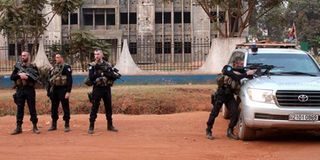Central African Republic minister seized by armed men

French soldiers of the European force in the Central African Republic patrol in the capital Bangui on January 20, 2015 while negotiations were under way to free a French charity worker and a churchman, who were seized on January 19 in an area of the city controlled by anti-balaka fighters. AFP PHOTO
What you need to know:
- No group have claimed responsibility for the kidnapping.
- Violence between rival factions has plunged the deeply impoverished country into an unprecedented political and security crisis.
BANGUI
Armed men on Sunday kidnapped the Central African Republic minister for sport and young people and former rebel chief Armel Ningatoloum Sayo as he returned from church in the capital Bangui, his wife said.
The kidnapping is the first of a member of the government, though comes amid a spate of abductions in the city in the last week.
Sayo's wife, Nicaise Danielle Sayo, said the couple were returning from church on Sunday morning when the kidnappers stopped them.
Another source close to the family said that the kidnappers, who were travelling in a taxi, blocked the minister's car.
"Three men got out and fired into the air. The minister asked them 'what's the problem' but they just indicated him to get into the taxi... then they left," the source said.
Sayo is the former leader of the Revolution and Justice movement based in the country's north east but entered the government of Prime Minister Mahamat Kamoun after the signing of a peace agreement in July 2014.
MILITIA
No group has claimed responsibility for the kidnapping.
On Monday, French aid worker Claudia Priest was snatched by the country's Christian anti-balaka militia but was subsequently freed.
Priest, 67, who arrived back in France on Sunday, was kidnapped along with a local man. A UN employee was also briefly detained by the anti-balaka the following day.
The Central African Republic's government condemned Sayo's kidnapping as yet another act of "barbarism" by assailants aiming to to create instability.
Violence between rival factions has plunged the deeply impoverished country into an unprecedented political and security crisis.
The conflict that began in 2013 has claimed thousands of lives.
The anti-balaka are mainly Christian militias formed to fight off relentless attacks from mostly Muslim rebels of the Seleka coalition. The Seleka seized power in March 2013 but were routed from Bangui in January last year.
Anti-balaka means "anti-machete" in the local Sango language and refers to the weapon of choice wielded by the Seleka — but also taken up by the vigilantes.
Both groups have been accused of serious abuses against civilians.





